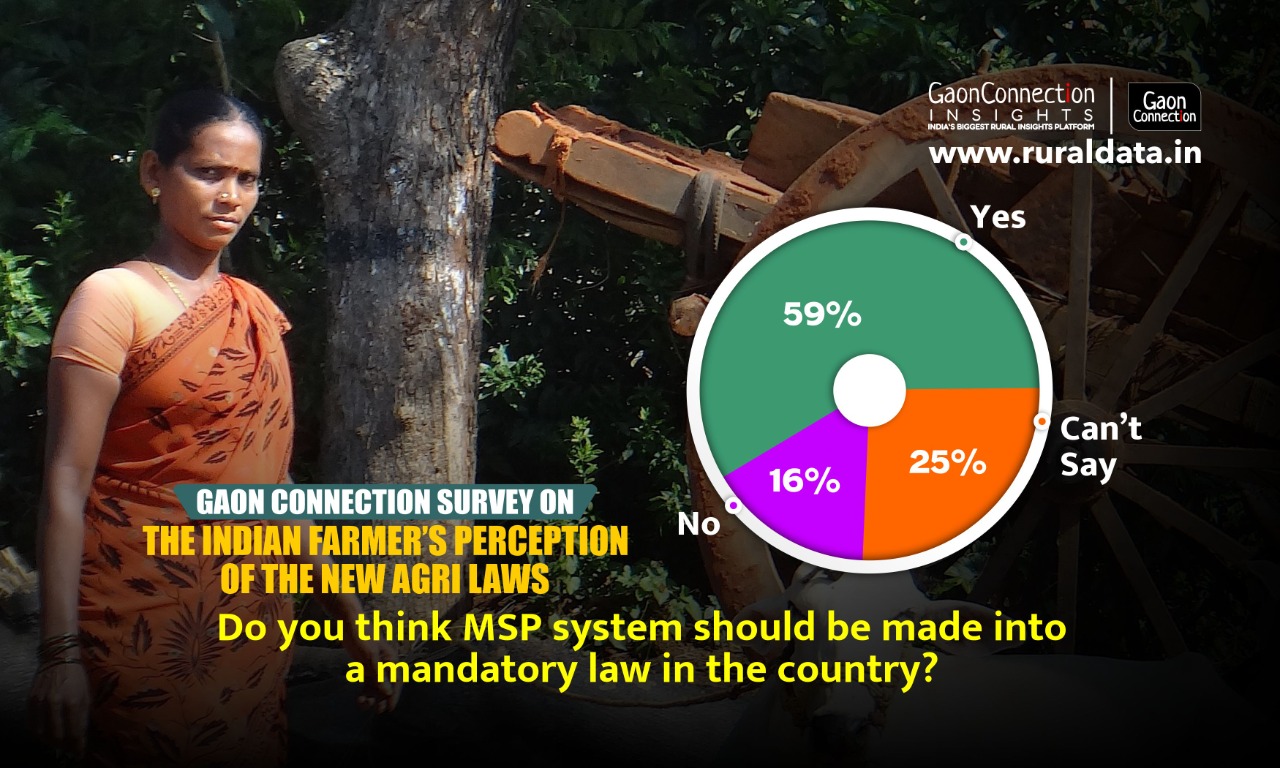Thirty nine per cent respondent farmers fear the three agri laws enacted last month would lead to abolishment of the minimum support price (MSP) in the country. An equal percentage of respondent farmers fear these central acts would lead to shutting down of government mandis/Agricultural Produce Market Committee (APMC) in the country leaving them at the mercy of private companies and corporates.
This is not all. Close to half the farmers (46 per cent) fear the new farm laws will lead to big corporates/private companies exploiting them. These are some of the key findings of Gaon Connection’s recent rapid survey whose findings have been released as the ‘The Rural Report 2: The Indian Farmer’s Perception of the New Agri Laws’ .
For more than a month now, farmers’ protests have rocked some parts of the country, especially Punjab and Haryana, as a section of farmers view the recently passed agri laws as hurting the interest of their community. Farmers have used various means of bandhs, rasta rokos, rail rokos to oppose these acts. These protests are still continuing and picking up pace.
To understand the Indian farmer’s perception towards the new agri laws, Gaon Connection Insights, the data and insight arm of India’s largest rural media platform, conducted a rapid survey between October 3 and October 9 in 53 districts across 16 states of the country. Among other things, the survey tried to capture the fears of farmers towards the three new laws – The Farmers’ Produce Trade and Commerce (Promotion and Facilitation) Act, 2020; The Farmers (Empowerment and Protection) Agreement of Price Assurance and Farm Services Act, 2020; and The Essential Commodities (Amendment) Act, 2020.
Respondent farmers feared that The Farmers’ Produce Trade and Commerce (Promotion and Facilitation) Act, 2020, that allows them to sell their produce outside of the notified APMC market yards, will hasten the end of the mandi/APMC system, which in turn would witness the end of MSP, too.
“The government’s decision will finish off the mandi system. This will harm the farmers and benefit corporates and middlemen,” said Rahul Raj, a young farmer and state president of Rashtriya Kisan Mazdoor Sangathan, Madhya Pradesh, responding to Gaon Connection’s rapid survey.
Thirty nine per cent of the surveyed farmers fear that the mandi/APMC system would be abolished. The most worried are farmers from the northwest region (71.5 per cent) that includes Punjab, Haryana and Himachal Pradesh. They are followed by 38.2 per cent from Assam,West Bengal, Odisha, and Chattisgarh. Thirty seven per cent of the surveyed farmers from Maharashtra, Gujarat and Madhya Pradesh also felt it was but a matter of time that the mandi would disappear (see table below).
Source: https://insights.gaonconnection.com/wp-content/uploads/2020/10/The-Rural-Report-2.pdf
Even though the Central government has said the farmer is at liberty to sell his produce at any mandi, the dissenting farmers are not impressed. “We are not being able to sell our produce in our own districts, how are we expected to travel to another mandi to do so,” Anil Pandey, a farmer respondent from Himmatpur Motahaldu, in Haldwani, Nainital, Uttarakhand, asked Gaon Connection. Thirty per cent of the respondents from Uttar Pradesh, Bihar and Uttarakhand in the north zone also think the mandis will be dismantled by the government.
“The bigger farmer can take his produce anywhere and sell it, but not the smallholding farmers,” worried Sandeep Maagar, Deola in Nasik, Maharashtra.
The Farmers’ Produce Trade and Commerce (Promotion and Facilitation) Act, 2020 also prohibits state governments from levying tax on sale and purchase of agricultural produce outside the mandis and gives farmers the freedom to sell their produce at remunerative prices. Farmers say exempting taxes on sales made outside the mandis will weaken the existing market system. And that it was but a matter of time that the government would close all mandis and APMCs.
Forty six per cent of the total respondents feared that this move would leave them at the mercy of private companies.
Source: https://insights.gaonconnection.com/wp-content/uploads/2020/10/The-Rural-Report-2.pdf
“But the farmer is unable to sell his crop in his own district, how will he sell it elsewhere?,” asked the Delhi-based VM Singh, convener of the Akhil Bhartiya Kisan Sangharsh Samanvaya Samiti. “There are so many farmers who have neither the money nor the means to take their produce to far away mandis or sell it online. No wonder they are opposing the act,” said Singh to Gaon Connection.
The price factor
The survey also revealed that most of the farmers who worried that the mandis/APMC would soon be dismantled were the very same who depended on the MSP. Thirty nine per cent respondent farmers believe that the new agriculture laws will usher in the end of the MSP system. This concern was again more amongst the farmers in the northwest region (65 per cent).
Source: https://insights.gaonconnection.com/wp-content/uploads/2020/10/The-Rural-Report-2.pdf
“Both the prime minister and the agriculture minister have repeatedly said that the minimum support price system is here to stay. If that were the case, why have they not included that clause in the act,” Abhimanyu Kohad, spokesperson of Rashtriya Kisan Mahasangh, Haryana demanded to know. He gave the example of Bihar where the government had fixed the rate of maize at Rs 1,850 a quintal, but the farmers are not being able to sell to traders at more than Rs 600 a quintal. “Is this the progress the government is promising us? It is a disaster,” Kohad declared vehemently.
Sixty five per cent of surveyed farmers from Punjab, Haryana and Himachal Pradesh fear that the MSP system will disappear along with the mandis. They fear that the government eventually will stop crop procurement at MSP.
Paying the price
When the bill was passed in parliament, Prime Minister Narendra Modi had assured the farmers that the MSP system would continue. To appease the farmers’ fears, the government even announced the minimum support price for the rabi season a month ahead and fixed the minimum price for A grade paddy at Rs 1,888 per quintal. But, they are not being able to sell it at that price, complain farmers who are getting only Rs 1,200-1,300 per quintal for their produce. They lay the blame for this squarely on the agri laws.
That is the reason that 59 per cent of the surveyed farmers wanted a law that makes MSP compulsory. Respondents especially in the northwest and west zones pointed out that despite the Central government’s assurances that the MSP would remain, there was nothing written in the agri-law that safeguards the MSP.
Besides anxiety about the MSP, 46 per cent of the surveyed farmers believed that throwing open procurement of produce to companies and multinationals would lead to farmers being exploited. Of these most of the farmers were from the northwest region (76 per cent) and from the west zone (58 per cent). Forty five per cent of the respondents said the agri laws sided with the private companies, middlemen and multinationals instead of the farmers.
However, only 29 per cent of the surveyed farmers really believed what the government assured them – that the new agri laws will double their income by 2022.



















